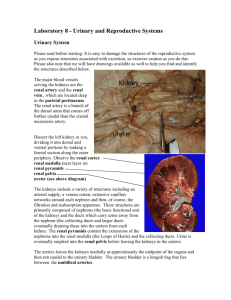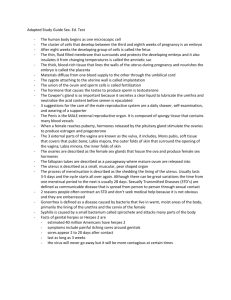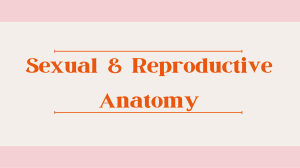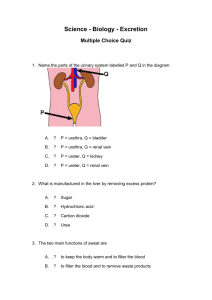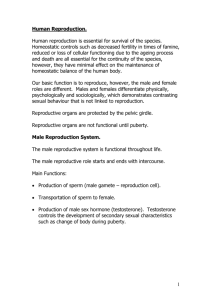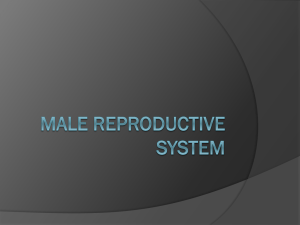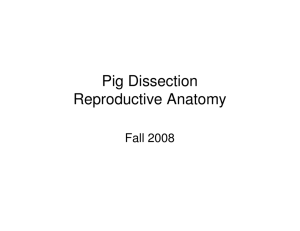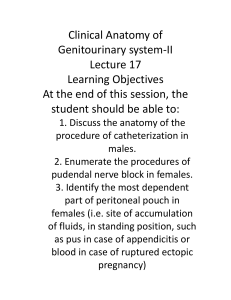UROGENITAL SYSTEMS The major organs of the urinary system
advertisement
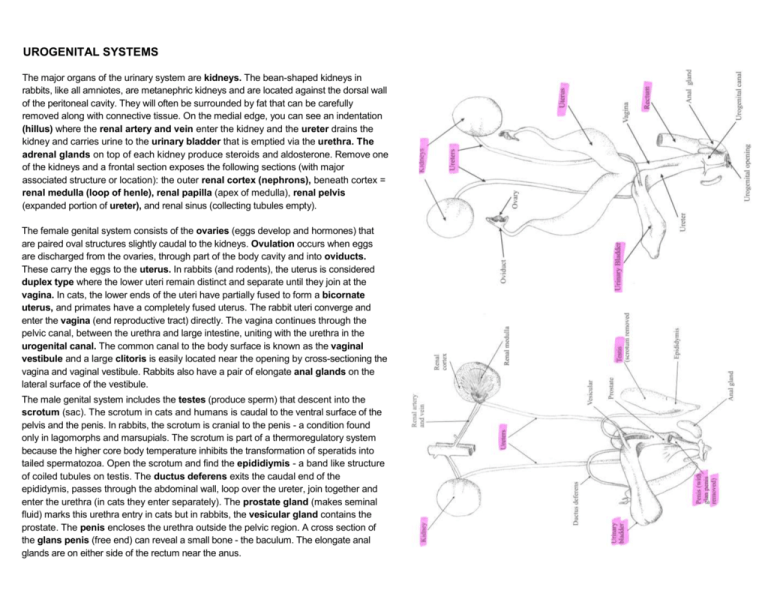
UROGENITAL SYSTEMS The major organs of the urinary system are kidneys. The bean-shaped kidneys in rabbits, like all amniotes, are metanephric kidneys and are located against the dorsal wall of the peritoneal cavity. They will often be surrounded by fat that can be carefully removed along with connective tissue. On the medial edge, you can see an indentation (hillus) where the renal artery and vein enter the kidney and the ureter drains the kidney and carries urine to the urinary bladder that is emptied via the urethra. The adrenal glands on top of each kidney produce steroids and aldosterone. Remove one of the kidneys and a frontal section exposes the following sections (with major associated structure or location): the outer renal cortex (nephrons), beneath cortex = renal medulla (loop of henle), renal papilla (apex of medulla), renal pelvis (expanded portion of ureter), and renal sinus (collecting tubules empty). The female genital system consists of the ovaries (eggs develop and hormones) that are paired oval structures slightly caudal to the kidneys. Ovulation occurs when eggs are discharged from the ovaries, through part of the body cavity and into oviducts. These carry the eggs to the uterus. In rabbits (and rodents), the uterus is considered duplex type where the lower uteri remain distinct and separate until they join at the vagina. In cats, the lower ends of the uteri have partially fused to form a bicornate uterus, and primates have a completely fused uterus. The rabbit uteri converge and enter the vagina (end reproductive tract) directly. The vagina continues through the pelvic canal, between the urethra and large intestine, uniting with the urethra in the urogenital canal. The common canal to the body surface is known as the vaginal vestibule and a large clitoris is easily located near the opening by cross-sectioning the vagina and vaginal vestibule. Rabbits also have a pair of elongate anal glands on the lateral surface of the vestibule. The male genital system includes the testes (produce sperm) that descent into the scrotum (sac). The scrotum in cats and humans is caudal to the ventral surface of the pelvis and the penis. In rabbits, the scrotum is cranial to the penis - a condition found only in lagomorphs and marsupials. The scrotum is part of a thermoregulatory system because the higher core body temperature inhibits the transformation of speratids into tailed spermatozoa. Open the scrotum and find the epididiymis - a band like structure of coiled tubules on testis. The ductus deferens exits the caudal end of the epididymis, passes through the abdominal wall, loop over the ureter, join together and enter the urethra (in cats they enter separately). The prostate gland (makes seminal fluid) marks this urethra entry in cats but in rabbits, the vesicular gland contains the prostate. The penis encloses the urethra outside the pelvic region. A cross section of the glans penis (free end) can reveal a small bone - the baculum. The elongate anal glands are on either side of the rectum near the anus.

